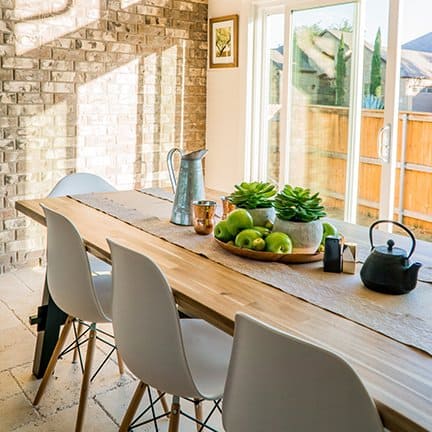
When selling a home, feedback after the house viewing from prospective home buyers is one of the most valuable resources available to homeowners.
What is Buyer Feedback?
Buyer feedback is the buyer’s opinion of the home, its condition, and price after the buyer has actually seen the house. Feedback usually comes in the form of short answers to a set of questions asked by the listing agent to the buyer’s agent after the showing has occurred.
The questions here are generally short but direct and should try to get information on things like pricing and condition. When we present the questions, we ask about the client’s impression because it increases the chance of the agent answering honestly and directly as well. For example, “my client hated _______ but I thought it was awesome”.
Here are some examples of good feedback questions and why.
- What was your client’s overall impression of this home? The overall impression question is usually answered with a simple “They liked it” but it opens the door for buts and this is what you are looking for when getting feedback.
- They liked the house but there was a strange smell.
- They liked the house but the neighbor’s dogs barked a lot.
- They liked the house but some of the room colors were too wild.
These are usually issues that can be fixed once the home sellers are made aware.

- How did this home compare to others you have seen? This is an important question because it gives you insight as to how your home stands up to the competition. If the answers are generally positive, you will know that your pricing is in the ballpark. On the other hand, if the answers are negative, your realtor or listing agent will need to do some digging in order to find out more information about why the home compares less favorably than the competition to the buyers.
- What is your opinion on the price? This one will almost always be answered with “Too High”. That’s just the nature of buyer’s agents but what you are looking for is the information that comes after the initial statement. In other words, “Price is too high we saw bigger houses on larger lots for less money or the same price”. This gives the kind of market intelligence you can use.
How to Get Good Feedback
We generally try to keep the feedback questions to a minimum so as to get a better quality of answer. We find these three questions help us determine most of what we need to know. We have found that the more questions we asked the less authentic and helpful the feedback tends to be.
There are a lot of other feedback questions you can ask, for example.
- What did you like most about this home?
- What did you like least about this home?
- What would it take to make you buy this home today?
Feedback is sometimes very hard to get from the buyer’s agent. This is why we avoid asking too many unnecessary questions when we do have an opportunity to get feedback.

Before the internet and e-mail, the listing agent would obtain feedback by tracking down the buyer’s agent, usually via telephone, and having a short conversation about the agent’s and their buyer’s candid thoughts on issues like pricing and property condition.
The listing agent would then take this sometimes brutally candid and unpleasant information and present it to the home sellers in a more palatable version.
Modern feedback comes in from questionnaires e-mailed to the buyer’s agents just after the showing has taken place. These questionnaires are usually shared with the home sellers so they usually see them at the same time as their agent does. Since agents are aware that the home sellers are going to be reading their feedback, their responses are much less direct than in the old days and in many ways less helpful.
This is why it is so important to work with an experienced listing agent. You need someone that can read between the lines of feedback, decode the feedback, and get to the point of what the buyers are really saying about your house. If the home isn’t selling is it because of the price or condition? A good listing agent will know the answer.
How Does Good Buyer Feedback Help You?
Good feedback from a buyer can help you greatly in the selling process. It can give you “to-do” items to help you sell your home faster. The feedback also helps you evaluate the competition and be able to explain how your home fits into the bigger picture of your local market. If the price is too high or if there are issues that are keeping the home from selling, a good listing agent will have those difficult conversations.

Of course, It’s difficult for homeowners to see their homes from an unbiased perspective. Homes hold many memories and stir up emotions that may be hard to relinquish, especially when it’s time to sell, and especially when negative feedback comes in. It’s important to adopt the attitude that once you put your home on the market, you are no longer a homeowner, you are a home seller. The home sale is a business transaction and you are competing with other homes to attract a buyer. While sometimes difficult to hear, the sooner the homeowner can deal with the negative feedback the sooner they can get to the issues keeping their house from selling.
The prospective buyer is simply looking for the best home they can find for the money. If your home doesn’t appear that way to the buyers, it will continue to sit on the market until the competition is gone. Feedback can help you understand what needs to happen in order to make it appear as the best value out there.

When feedback comes in, homeowners are often surprised to hear the comments. Pet odors are a common issue that many homeowners overlook but are often noticed by potential buyers. Maybe the kitchen and/or bathrooms are dated and, consequently, bringing down the value of the home. Sometimes the fixes are easy; fresh coats of paint and deep cleaning carpets can boost a home’s appeal. However, many times, it’s the listing price of the home that deters potential buyers.
Setting the right price for the most efficient and profitable sale requires extensive knowledge of what’s happening in the local real estate market, as well as the latest information about mortgage rates and availability. Internet-savvy buyers look at comparable homes for sale in the area and certainly have a good sense as to whether the home is priced accurately for the neighborhood. Although some homeowners want to price their homes based on Zillow and Trulia estimates, these are not always reliable sources as markets can change rapidly and sales data takes time to find its way into those systems.
So, the key takeaway when listing your home is to work with a knowledgeable real estate agent who is familiar with the community and will help set a realistic selling price. And always listen to the feedback.

